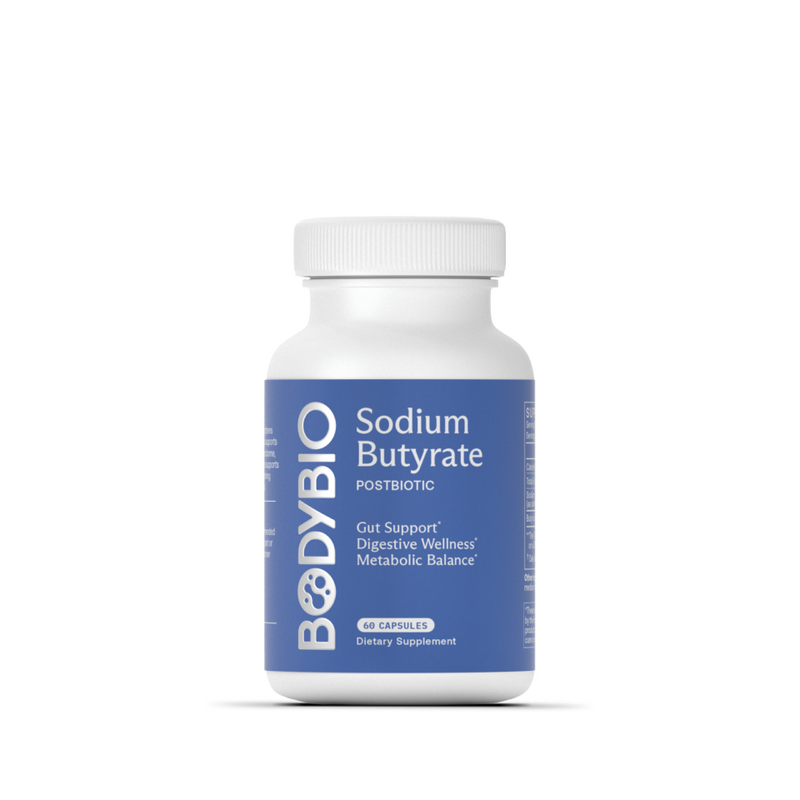Is Your Gut Out of Whack? Gut Dysbiosis Causes, Symptoms, and Treatment
When you’re in the process of investigating your gut health, “gut dysbiosis” may seem like the last thing you want to hear. It’s a scary-sounding term — literally translating to “a bad/difficult mode of life.” Yikes.
But you can take a deep breath — gut dysbiosis doesn’t have to be as scary as all that. It represents a state of imbalance, true, but it is totally possible to recover and restabilize the gut from a state of dysbiosis. It doesn’t have to be a difficult, arduous task, and actually, it’s likely to improve a lot faster if you don’t see it that way.
In this article, we’ll discuss what dysbiosis is, potential causes of dysbiosis, and treating dysbiosis, including possible diet, lifestyle, and supplement recommendations.
Table of Contents:
- What is Dysbiosis?
- Dysbiosis Causes
- Gut Dysbiosis Symptoms
- Do You Need to Test for Gut Dysbiosis?
- Dysbiosis Treatment
- Diet
- Lifestyle
- Supplementation
- Support Your Microbiome to Heal Your Gut
What Is Dysbiosis?
In short, dysbiosis occurs when the microbiome (of the gut, skin, vagina, etc.) skews toward an imbalanced state that often causes symptoms like:
- Fatigue
- Brain fog
- Mood issues
- Bloating
- Constipation and other digestive ailments
- Dry or flaky skin
- Bacterial or yeast infections
- And more.
We often associate dysbiosis with pathogens like parasites or bacteria, but even an overabundance of good bacteria like L. acidophilus can qualify as dysbiosis. This is why it’s important to be mindful if you’re taking certain probiotics or even eating too many fermented foods.
Despite its popularity, dysbiosis is not a diagnosis in and of itself. It typically presents as one key component of a health condition that, when addressed, can unlock significant healing.
Conditions that may indicate a state of dysbiosis include [1, 2, 3, 4, 5, 6]:
- Small intestinal bacterial overgrowth (SIBO)
- Irritable bowel syndrome (IBS)
- Crohn’s disease and ulcerative colitis (IBD)
- Chronic constipation
- Chronic gut infections such as candida
- Bacterial vaginosis or chronic yeast infections
- Obesity
- Heart disease
- Diabetes.
Dysbiosis Causes
The microbiome, throughout various areas of the body, is a pretty sensitive collection of organisms. Our bacterial and fungal friends like things just so — and changes like systemic inflammation, a diet low in prebiotic foods and high in processed oils and sugar, environmental toxins like mold and pollutants, exposure to chemicals, and even emotional stressors can all throw its delicate balance out of whack.
Another popular cause of dysbiosis is antibiotic use. Sadly, many of us are familiar with the obligatory yeast infection that pops up after a round of antibiotics. Then the antifungal drugs used to treat that infection set off the bacteria again, and on and on in a vicious cycle. (This is why you should always take probiotics with a course of antibiotics!) [7] Taking other medications may also disrupt the microbiome in some cases.
Dysbiosis also represents a chicken and egg situation with regards to many chronic illnesses. Is it the chronic illness that contributes to the dysbiosis or vice versa? The answer is likely individual, depending on a person’s genetics, environmental exposure, diet, and so on.
Research is still catching up to this question as we learn more about what impacts the health of the microbiome and the impact of the microbiome on our health in turn [8].
Gut Dysbiosis Symptoms
Gut dysbiosis may be at the foundation of other kinds of dysbiosis, like dysbiosis on the skin or in the urogenital system. It can also present as a confusing array of different symptoms, including:
- Fatigue
- Brain fog
- Joint pain
- Skin rashes
- Almost any digestive symptom you can think of: bloating, gas, diarrhea, constipation, etc.
- Heartburn/acid reflux
- Disrupted hormone balance
- Depression, anxiety, and/or mood swings.
These are not the only symptoms by any means, but if you experience any of these, gut dysbiosis can be worth looking into.
Do You Need to Test for Gut Dysbiosis?
It pays to be skeptical of tests claiming to be able to identify the exact microbial composition of your gut, including any pathogens. There are a lot of microbiome tests out on the market these days, and not all of them are reliable [9]. Plus, they are usually quite expensive, they are subject to change rather quickly, and they can provide an overwhelming amount of data that seems impossible to tackle.
From a patient perspective, it can be easy to zero in on one result from a test and hyperfixate on that issue (understandably!). But that kind of constantly on-alert nervous system is not a good place to heal from. If you know you’re the type to get overwhelmed by data and you focus a little bit too much on constantly taking the next right step, you might actually benefit more from taking a step back from testing and focusing on relaxing your nervous system.
This isn’t to say that no one should ever have testing done. But, more data isn’t always better, and you can start making concrete changes to your microbiome just through diet and lifestyle changes alone. A next step after that would be supplementation, ideally recommended by an experienced clinician who can see your overall health picture. Then, if you still aren’t where you want to be, testing might be a logical next step.
Dysbiosis Treatment
There might be a lot of doom and gloom in the conversation around dysbiosis, but it is absolutely treatable and may not even require expensive testing and a complicated antimicrobial regimen to resolve. Here are the basics to get started on healing and reversing dysbiosis.
Diet
Your diet is a major cornerstone in the foundation of your gut health — in part to keep the microbiome happy and self-regulating.
You probably already know the drill: cut out highly processed foods, toxic oils (these are everywhere; read your labels!), and excessive sugar. Add in a variety of whole fruits and veggies, whole grains, starches, good quality protein and healthy fats.
Consuming prebiotic foods will feed your microbiome and help them produce beneficial metabolites like butyrate that feed and protect the gut lining.
Lifestyle
Don’t underestimate the power of a healthy lifestyle to change your physical health! What does “a healthy lifestyle” look like? It really depends on your current health stage. For example, exercise is definitely beneficial for just about everyone, but if you’re coming from a place of severe fatigue and gut issues, maybe a short daily walk is all you can manage right now. And that’s perfectly okay — healing is all about slow, steady progress.
Other than exercise, getting plenty of sleep, enjoying time with loved ones, practicing meditation or other mindfulness activities, and practicing hobbies outside of work are genuinely important to maintain your health and rebalance a state of dysbiosis. Your body senses safety in these activities, and that sets the stage for lasting healing to take place.
Supplementation
A lot of people tend to reach for a supplement first to heal dysbiosis, but supplements should actually only be added after diet and lifestyle aspects are dialed in, if they are still needed at that point. This is because without a good foundation of nutrition and nervous system regulation, supplements may be wasted due to improper absorption.
If you’re at a place where diet and lifestyle have been addressed, and you’re still experiencing lingering symptoms, you have a few supplement options to try:
Probiotics are perhaps an obvious choice and generally a safe place to start. Multi-strain formulas have been shown to improve IBS symptoms like bloating, gas, diarrhea, and constipation [10].
Butyrate is a short-chain fatty acid, a beneficial molecule made by certain species of bacteria in the colon. Research shows that supplemental butyrate has improved symptoms of inflammatory bowel disease, which may contribute to and be caused by dysbiosis in the gut [11, 12].
Targeted antimicrobials such as oil of oregano, artemisia annua, berberine and others can help curb high levels of problematic microbes, including bacteria, fungi, and parasites [13, 14, 15]. Practitioners often recommend rotating between a few antimicrobials regularly to prevent resistance and provide different benefits. Antimicrobials can be quite strong for some people though, so consult with your practitioner on the right dosage to start with.
Support Your Microbiome To Heal Your Gut
There has been a lot of fear-based messaging around dysbiosis in recent history, but having an imbalanced microbiome is not a death sentence. It’s very fixable, sometimes just by allowing ourselves to rest, eat well, and experience safety within the body. But when that’s not enough, you can support your microbiome using targeted supplements like antimicrobials and butyrate.




